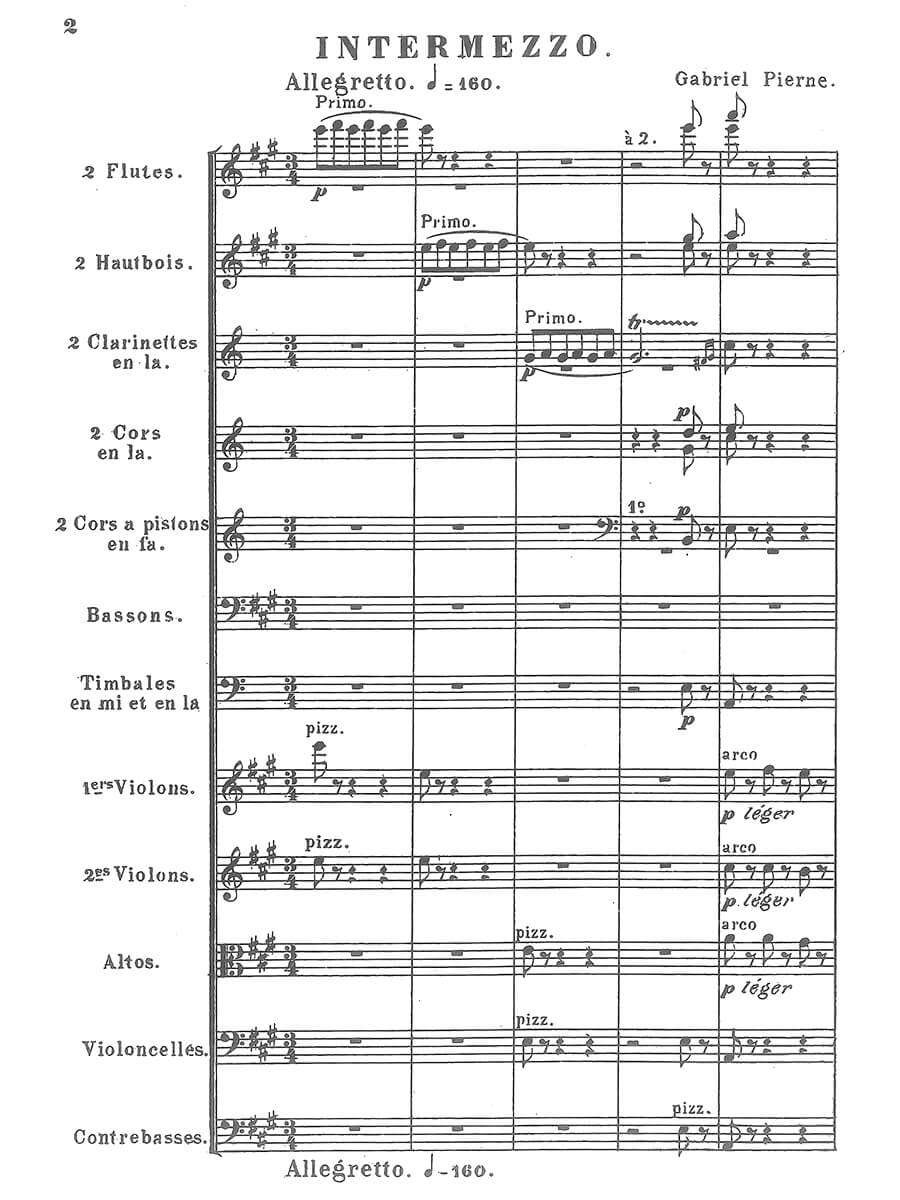Intermezzo for orchestra
Pierné, Gabriel
16,00 €
Gabriel Pierné – Intermezzo for orchestra
(b. Metz, 16 August 1863; d. Ploujean, 17 July 1937)
(First performance: 19 July 1884, Royan)
Preface
Pierné came from a musical family: his mother was a piano teacher and his father a vocal coach. The family moved from Lorraine to settle in Paris in 1871, following the annexation of Metz to Germany after the Franco-Prussian War. Young Gabriel entered the Conservatoire and quickly displayed his considerable musical prowess, winning the medal for solfège at the tender age of 11. He subsequently gained prizes for the organ, piano and counterpoint, and in 1882 his cantata Edith won the Prix de Rome. His teachers included César Franck and Jules Massenet (to whom Edith is dedicated). He struck up a close relationship with his classmate Claude Debussy, which remained a constant until Debussy’s death in 1918. With Franck’s passing in 1890 Pierné replaced his teacher as organist at Sainte-Clothilde, a post he held for eight years. Pierné’s career migrated towards conducting, with his appointment in 1903 as deputy of the Concerts Colonne; he succeeded Edouard Colonne as principal conductor in 1910, and held that post until his retirement in 1934. He maintained the orchestra’s reputation for championing new music, introducing works by Debussy, Ravel, Roussel and Stravinsky among others; the quality of his interpretations meant that he quickly became one of the most powerful figures in the Parisian post-War scene. Pierné’s name was also linked with the glamorous world of the Ballets Russes, having conducted the world premiere of Stravinsky’s Firebird back in 1910. He became a member of the directing committee of studies at the Conservatoire, and in 1925 was elected a member of the Académie des Beaux-Arts. Pierné was dubbed successively Chevalier (1900), Officer (1926) and Commander (1935) of the Légion d’Honneur. He was honored at least as much for his compositions as for his performing ability: his oeuvre extends from an unpublished song in 1872 to the Introduction et variations sur une ronde populaire for saxophone quartet (1936). Many of his early works – such the present Intermezzo – exude the easy-going allure of salon music; they are sensual, wordly, and essentially popular in character. The other side of his musical personality can be seen to be influenced by the serious-minded church musician, Franck, and this aspect produced substantial outpourings such as the oratorios The Children’s Crusade (1902) and St Francis of Assisi (1912), and a later orchestral suite with the same Umbrian inspiration, Franciscan Landscapes (1920). As David Cox has pointed out in his Grove entry on the composer ‘It was sometimes said that his willing absorption [as a conductor] in so much music of other composers adversely affected his personal style – his composition give the impression of a cultivated synthesis of many tendencies in the French music of the time.’ This is a fair point, and yet the sheer professionalism of his technique, his melodic facility (comparable to that of Saint-Saëns), his gracefulness of utterance even when dealing with weightier subject matter would seem to mark Pierné out as a composer whose works should be far better recognized and more widely known. As it is, aside from the odd keyboard and chamber piece, the oratorios, orchestral music and operas that represent the real substance of his output are almost entirely neglected. …
Read full preface > HERE
| Score No. | 4083 |
|---|---|
| Edition | Repertoire Explorer |
| Genre | Orchestra |
| Size | |
| Printing | Reprint |
| Pages | 40 |
